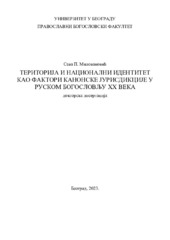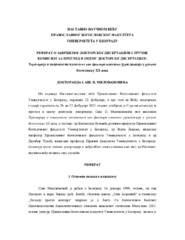Приказ основних података о дисертацији
Територија и национални идентитет као фактори канонске јурисдикције у руском богословљу XX века
Territory and national identity as factors of canonical jurisdiction in twentieth-century Russian theology
| dc.contributor.advisor | Jović, Rastko | |
| dc.creator | Milovanović, Sava | |
| dc.date.accessioned | 2024-01-17T15:56:49Z | |
| dc.date.available | 2024-01-17T15:56:49Z | |
| dc.date.issued | 2023-07-03 | |
| dc.identifier.uri | https://eteze.bg.ac.rs/application/showtheses?thesesId=9483 | |
| dc.identifier.uri | https://fedorabg.bg.ac.rs/fedora/get/o:32333/bdef:Content/download | |
| dc.identifier.uri | https://plus.cobiss.net/cobiss/sr/sr/bib/134091785 | |
| dc.identifier.uri | https://nardus.mpn.gov.rs/handle/123456789/22082 | |
| dc.description.abstract | Основни циљ овог рада јесте анализа, са историјског и канонског аспекта, ставова руских црквених структура и богослова о територији и националном идентитету као факторима црквене јурисдикције у 20. веку. У руском богословљу 20. века постојале су две струје које су уз коришћење готово истоветних канонских правила, на радикално другачији начин, тумачили однос територије, националности и црквене организације. Уобличавање аргументација ове две струје може се идентификовати на самом почетку 20. века у контексту расправе о обнови аутокефалије Грузинске патријаршије. Једна струја је канонске одредбе, конкретно 34. Апостолско правило, тумачила на тај начин да се тим правилом легитимизује национална особеност као довољан услов за црквену аутокефалију. У складу са таквим тумачењем, Грузини су могли имати аутокефалну Цркву без обзира на то што још увек нису имали самосталну државу. Друга струја је инсистирала на неопходности државне самосталности као предуслова аутокефалије. Оба гледишта су доводила у блиску везу емпиријске факторе и организацију Цркве. Уобличавање идеја територијалне и националне богословске струје започето је дакле почетком 20. века, док је њихова потпуна систематизација извршена у међуратном периоду. Повод за ову систематизацију представљало је оснивање црквене структуре под називом Руска загранична Црква на територији других помесних Православних Цркава. Поред пастирских разлога бриге о руским имигрантима, постојање ове паралелне црквене структуре оправдавано је националним принципом црквене организације. Посебну важност тематика ове дисертације добија у контексту православне дијаспоре и организације Цркве у земљама које су настале након распада Совјетског Савеза. У православној дијаспори, у складу са националним принципом јурисдикције, постојало је више епископа различитих националних Цркава, од којих се сваки духовно бринуо само о пастви дотичне националности. Са друге стране, у земљама бившег Совјетског Савеза, попут Естоније, изнова се поставило питање фактора национално свесне заједнице у организацији Цркве. Сагледавање ове проблематике са аспекта јединства Цркве, али и из перспективе користи мисије Цркве отвара нове могућности тумачења улоге националног идентитета у организацији Православне Цркве. | sr |
| dc.description.abstract | The main goal of this dissertation is to analyse, from the historical and canonical aspect, the attitudes of Russian church structures and theologians about territory and national identity as factors of church jurisdiction in the 20th century. In the Russian theology of the 20th century there were two currents which, using almost identical canonical rules, interpreted the relationship between territory, nationality and church organization in a radically different way. The shaping of the arguments of these two currents can be identified at the very beginning of the 20th century in the context of the debate on the restoration of the autocephaly of the Georgian Patriarchate. One current interpreted canonical provisions, specifically the 34th Apostolic Rule, in such a way that this rule legitimizes national identity as a sufficient condition for church autocephaly. According to such interpretation, the Georgians could have had an autocephalous Church, despite the fact that they did not yet have an independent state. The other current insisted on the necessity of state independence as a precondition for autocephaly. Both views brought the empirical factors and the organization of the Church into close connection. The shaping of the ideas of the territorial and national theological current thus began at the beginning of the 20th century, while their complete systematization was carried out in the interwar period. The reason for this systematization was the establishment of a church structure called the Russian Church Abroad on the territory of other local Orthodox Churches. In addition to the pastoral reasons for caring for Russian immigrants, the existence of this parallel church structure was justified by the national principle of church organization. The topics of this dissertation gained special importance in the context of the Orthodox diaspora and the organization of the Church in the countries that emerged after the collapse of the Soviet Union. In the Orthodox diaspora, in accordance with the national principle of jurisdiction, there were several bishops of different national Churches in the same city, each of whom spiritually cared only for the flock of the nationality in question. On the other hand, in the countries of the former Soviet Union, such as Estonia, the question of the factors of the nationally conscious community in the organization of the Church has been raised again. Consideration of this issue from the aspect of the unity of the Church, but also from the perspective of the benefits of the mission of the Church, opens new possibilities for interpreting the role of national identity in the organization of the Orthodox Church. | en |
| dc.format | application/pdf | |
| dc.language | sr | |
| dc.publisher | Универзитет у Београду, Православни богословски факултет | sr |
| dc.rights | openAccess | en |
| dc.rights.uri | https://creativecommons.org/licenses/by-nc-nd/4.0/ | |
| dc.source | Универзитет у Београду | sr |
| dc.subject | 34. Апостолско правило, територија, ἔθνος, нација, Грузинска православна Црква, Московска патријаршија, Руска загранична Црква, дијаспора, Православна Црква у Америци, естонска црквена криза | sr |
| dc.subject | 34. Apostolic Rule, territory, ἔθνος, nation, Georgian Orthodox Church, Moscow Patriarchate, Russian Church Abroad, Diaspora, Orthodox Church in America, Estonian Church Crisis | en |
| dc.title | Територија и национални идентитет као фактори канонске јурисдикције у руском богословљу XX века | sr |
| dc.title.alternative | Territory and national identity as factors of canonical jurisdiction in twentieth-century Russian theology | en |
| dc.type | doctoralThesis | |
| dc.rights.license | BY-NC-ND | |
| dc.identifier.fulltext | http://nardus.mpn.gov.rs/bitstream/id/158537/Disertacija_14724.pdf | |
| dc.identifier.fulltext | http://nardus.mpn.gov.rs/bitstream/id/158538/Izvestaj_Komisije_14724.pdf | |
| dc.identifier.rcub | https://hdl.handle.net/21.15107/rcub_nardus_22082 |



